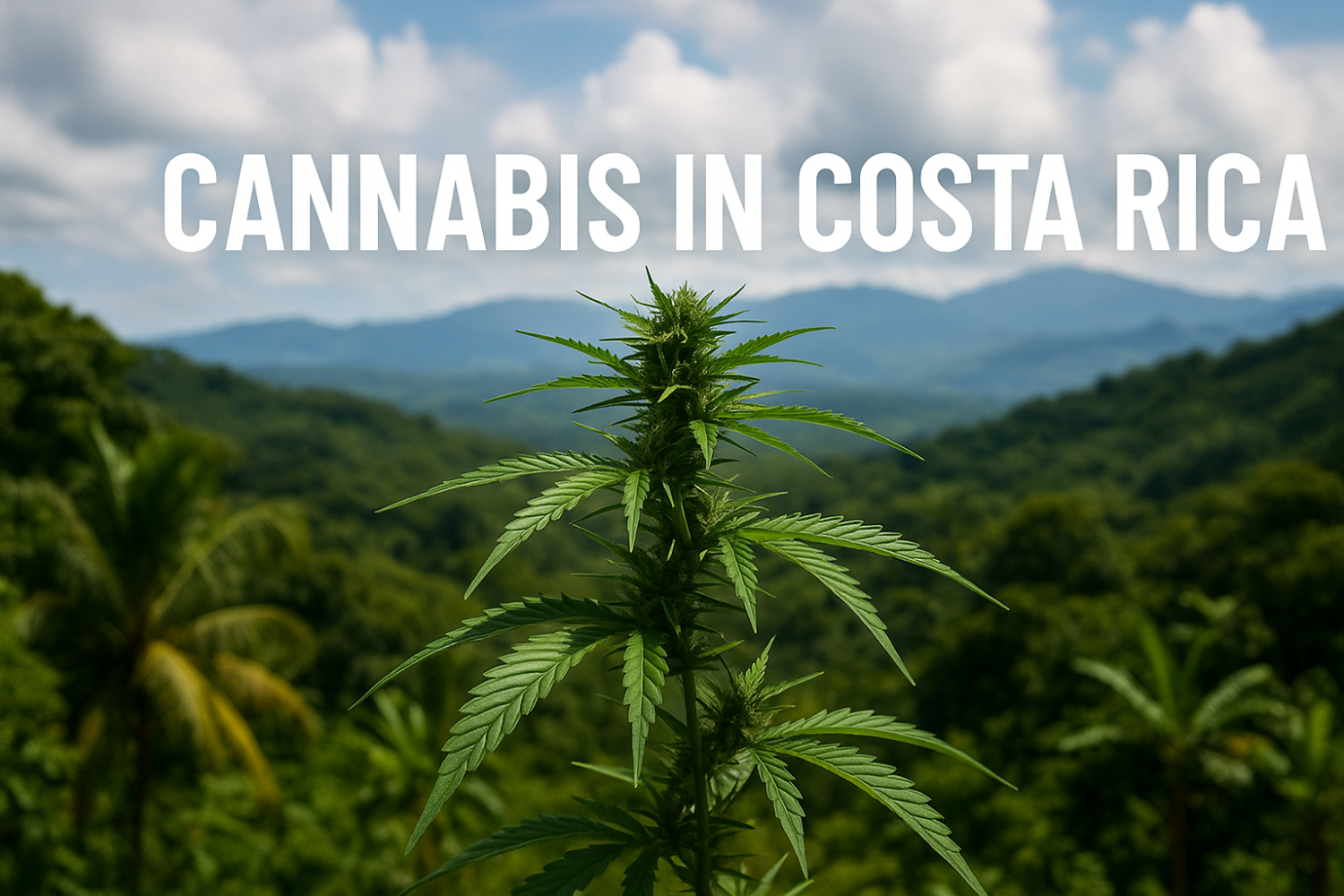Cannabis in Costa Rica has a culture that runs deeper than most people realize. Long before legalization, farmers, surfers, healers and backpackers quietly cultivated, consumed and valued the plant. Today the country stands at a turning point. What used to be hidden is becoming visible. From eco-lodges to wellness retreats, from hemp farms to medical clinics, a new chapter for cannabis in Costa Rica is unfolding.
This is the full breakdown of what’s happening with cannabis in Costa Rica, the laws, the culture, the farms, the tourism, and the big shift turning “weed country” into a symbol of nature, wellness and opportunity.
Cannabis in Costa Rica: Tradition Meets Transition
Cannabis in Costa Rica has always existed in the background of daily life. Along the Caribbean coast — in places like Puerto Viejo, Cahuita and Punta Uva, Afro-Caribbean communities used herbal knowledge, plants and ritual. Inland, surfers, backpackers and locals practiced an easy-going approach to the plant: a joint after surfing, a smoke circle on a beach bonfire, cannabis used for stress, sleep, connection.
Because of Costa Rica’s longstanding ethos of “pura vida,” its natural beauty and relaxed culture, cannabis was never completely underground in the way it was in many other countries. It was tolerated, informal, and woven into lifestyle, tourism and nature, even when laws remained restrictive.
Legal Status: Where Cannabis in Costa Rica Stands in 2025
Here’s the updated status for cannabis in Costa Rica, as of mid-2025.
Medical cannabis legal and regulated under Law 10113 (approved March 2022) for therapeutic use and hemp for food/industrial use.
Hemp is legal: defined as cannabis with < 1% THC, regulated for cultivation, production and commercialization under new regulations (e.g., RTCR 515:2024 effective June 2025) for medical cannabis products.
Recreational cannabis remains illegal as a regulated commercial market, but personal consumption is de facto decriminalized — possession of small amounts typically results in confiscation rather than jail.
Home cultivation without license is still illegal — no law has been passed that legally allows adults to grow cannabis at home.
The government continues to debate full legalization and regulation for adult-use cannabis, but a key recreational legalization bill was rejected by Costa Rica’s Constitutional Chamber, so the timeline remains uncertain.
In short: Medical and hemp pathways are open and growing. Recreational access is not yet regulated. The grey zone remains around personal use and grows.
The New Green Opportunity: Cannabis in Costa Rica’s Economy
Cannabis in Costa Rica offers significant opportunity. The country has:
- A tropical climate, abundant sunlight and rich volcanic soil — ideal for natural cultivation of cannabis and hemp.
- A global reputation for sustainability and eco-tourism, which aligns with cannabis wellness, hemp production and green manufacturing.
- A growing legal framework that enables hemp and medical cannabis investment, export potential, and agronomy innovation.
Hemp in Costa Rica is already being pitched as the next wave of sustainable crop: fiber, textiles, food, cosmetics. Licensed medical cannabis companies are emerging. Some rural areas are positioned to benefit from cannabis cultivation as an alternative to less-sustainable crops.
The phrase “green gold” is being whispered in agronomy circles. With the right regulation, Costa Rica could become a Caribbean cannabis tourism hub, a leader in natural cannabis cultivation and hemp manufacturing, and a model for Latin American transition.
Cannabis Tourism Is Real in Costa Rica
Even with recreational sales still illegal, cannabis tourism in Costa Rica is emerging and vibrant. Visitors can access tours, retreats and experiences that embrace the cannabis-and-wellness culture.
Popular hubs include:
- Caribbean side: Puerto Viejo, Cahuita, Punta Uva — laid-back communities with surf, rainforest, cannabis-friendly vibes.
- Pacific surf towns: Tamarindo, Nosara, Santa Teresa — where yoga, retreats and cannabis-friendly stays overlap.
- Nature retreats: La Fortuna (Arenal), Monteverde — where private lodges combine jungle, wellness and discreet cannabis use.
Tips for travelers:
While you cannot legally buy regulated recreational cannabis, you can familiarize yourself with the local culture, use discretion, stay in private spaces, and explore wellness services (CBD, cannabis wellness, herbal retreats). Just know: sale remains unregulated, public consumption may draw attention, and export/import is strictly illegal.
Culture: Cannabis in Costa Rica Is Pura Vida in Plant Form
Blessed with nature, a relaxed lifestyle and a love for community, Costa Rica’s cannabis culture is unique. It’s not about hype or heavy commercialism. It’s about nature, craft, wellness, creativity and authenticity.
Surfers, backpackers, healers, artists and expats all contribute to a cannabis culture that blends into the ecosystem — bonfires on the beach, surf breaks at dawn, herbal medicine by locals, hemp fiber experiments in rural zones.
Cannabis in Costa Rica isn’t a “stoner” stereotype. It’s part of a lifestyle narrative of connection, nature and presence.
Medical Cannabis: Research, Patients & Access
Medical cannabis is now a reality in Costa Rica. Under new regulation (RTCR 515:2024 effective June 21 2025) patients with prescriptions can access THC-based medicinal cannabis products (flowers, capsules, oral liquids).
Licensed pharmacies or authorized channels are required for distribution.
Research and agronomy institutes (including universities) are ramping up work in plant genetics, extraction science, cultivation methodologies and wellness applications. Clinics in San José and other cities are beginning to adopt cannabinoid therapies for chronic pain, PTSD, insomnia, epilepsy and other qualifying conditions.
The rollout is still early, many patients report limited product availability and high cost — but the framework is in motion and growing.
Roadblocks Slowing the Industry
Despite strong momentum, cannabis in Costa Rica faces significant hurdles:
- Licensing and regulatory complexity: full supply-chain traceability not yet fully implemented.
- Banking and financial services remain cautious.
- Home cultivation remains illegal, creating a disconnect with social reality.
- Public perception in more conservative or rural zones still leans cautious.
- Tourist expectations outpace legal infrastructure: many visitors assume full recreational access and are surprised to find limitations.
- A fully regulated recreational market is still years away and dependent on political momentum and treaty obligations.
What’s Next for Cannabis in Costa Rica
The push toward full recreational legalization continues — but with caution. Government statements suggest interest in regulated adult-use cannabis, tax revenue, job creation, and reducing illegal market share. However, the legal framework, constitutional constraints and international obligations mean design will be careful and incremental.
Predictions for what’s on the horizon:
- A licensed adult-use cannabis framework could emerge by 2026-2027, if political will and legislative momentum align.
- Growth in hemp exports (fiber, food, CBD) will likely accelerate sooner.
- Cannabis tourism will continue to evolve, with wellness retreats, private consumption stays, educational farm tours and hemp experiences becoming more formalized.
- Rural and indigenous communities could be central to social-equity cultivation and sustainable cannabis farming.
Costa Rica has the elements already: nature, tourism, wellness culture, eco-mindset, agricultural know-how. The question is now how it executes.
Why Cannabis in Costa Rica Matters Globally
Costa Rica is emerging as a model for how cannabis reform can align with sustainability, tourism, agriculture and wellness. Rather than chasing big hype or purely commercial gain, the country is showing how a “plant-forward” future can be built deliberately.
When you think of global cannabis trade, think Costa Rica: solar-rich cultivation, organic agronomy, wellness-travel integration, hemp-based manufacturing, and a tourism ecosystem built around nature and the plant.
Other countries in Latin America, the Caribbean and Central America are watching. Costa Rica’s approach could shape how the next decade of cannabis trade, travel and culture unfolds.
FAQ: Cannabis in Costa Rica
Q: Is recreational cannabis legal in Costa Rica?
A: Not yet. Recreational cannabis is still illegal to sell or regulate. Personal consumption is tolerated to a degree but remains technically unlawful.
Q: Can tourists buy cannabis legally?
A: No. There is no regulated retail market for recreational cannabis. Tourists should not expect storefronts. Medical cannabis is technically legal but primarily for residents/patients under prescription.
Q: Is medical cannabis available?
A: Yes — medical cannabis is legal under Law 10113 (2022) and regulated via RTCR 515:2024 as of June 2025. Patients with prescriptions can access THC-based medicinal products in licensed pharmacies.
Q: Is CBD legal?
A: Yes. Hemp-derived CBD products are legal if they meet regulatory requirements (low THC, proper sanitary registration). However, import/export, labeling and format must comply with Ministry of Health rules.
Q: Can you grow cannabis at home in Costa Rica?
A: No, at least not legally. Home cultivation without a license is still prohibited. Anyone cultivating plants for personal use is operating in a legal grey zone.
Q: What happens if I am caught with a small amount of cannabis?
A: Possession of small amounts is generally confiscated without criminal charge, but large amounts or intent to distribute remain punishable. The law doesn’t clearly define “small dose,” so enforcement varies.
Q: Is cannabis tourism allowed?
A: Cannabis-friendly tourism exists in practice — especially via private stays, retreats, CBD wellness, and informal use in surf towns — but it’s not yet part of a formal regulated adult-use market. Visitors must use caution and discretion.
Q: When will full recreational legalization happen?
A: There is no definitive date. Earlier bills were blocked, though political momentum exists. Many industry watchers expect progress by 2026-2027, but nothing is guaranteed.
Q: Can I bring cannabis into or out of Costa Rica?
A: No. Importing or exporting cannabis (non-hemp, high THC) is illegal. Even small amounts at the airport could trigger serious legal trouble.
Q: What about hemp export and business opportunities?
A: Hemp (cultivation, fiber, food, wellness products) is legal and regulated. This presents business opportunities in cultivation, manufacturing, export, wellness tourism and sustainable product design.
–
Women who enjoy cannabis and are traveling through Costa Rica can prioritize security and privacy thanks to services like Safe Rides for Women in Costa Rica. These services are becoming an increasingly trusted option for San Jose airport transfers and long distance transportation. As solo female travel continues to grow, demand for women only transportation in Costa Rica has increased, particularly for airport transfers and mountain routes.







![Understanding Vinyl Record Grading: A Complete Guide for Collectors-- [Photo by Bojan Marjanovic on Canva.]](https://respectmyregion.com/wp-content/uploads/2026/02/image-500x333.jpeg)